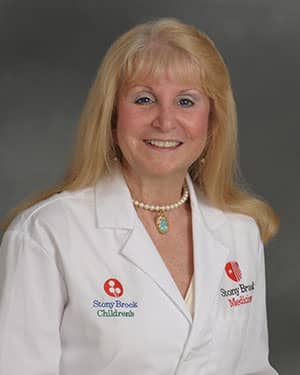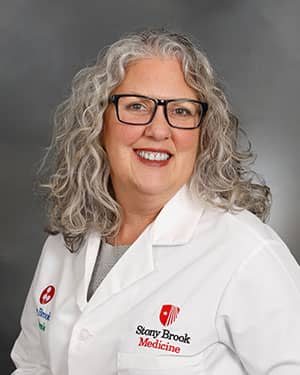Navigation Division of Genetics
Division of Genetics
For families of children with a genetic disorder — including rare, inherited metabolic diseases — diagnosing the problem is the first step. Next is understanding the nature of the disorder and determining the best plan to treat, manage and live with it. At Stony Brook Children's, we can help.
Our Division of Genetics provides comprehensive diagnosis, counseling and treatment of patients with inherited or congenital disorders.
In addition, we are Long Island's only Inherited Metabolic Disease Specialty Center, evaluating newborns discovered through state-mandated screening to have inborn errors of metabolism and then following those children lifelong.
In total, we see more than 1,600 children and adults each year. About 200 of these are children with inherited metabolic disorders.
We also engage in significant research and education. Through research, we seek a greater understanding of genetics and new ways to treat inherited disorders. Through our education endeavors, we share our knowledge with families and the community, as well as with medical students and residents enrolled in the Stony Brook University School of Medicine.
Services
The Division of Genetics offers a complete range of clinical and support services for infants, children, adolescents and adults with genetic disorders.
- Cancer genetic services: Testing, assessment and counseling related to hereditary forms of cancer.
- Clinical trials: Access to new and emerging therapies for genetic disorders.
- Diagnosis and evaluation: A complete range of specialized diagnostic laboratory tests, other assessments and dysmorphology/syndrome recognition.
- Genetic counseling: Information about inheritance patterns, risks and support groups.
- Infertility clinic: For male and female factors, conducted in collaboration with reproductive endocrinology and urology.
- Lysosomal enzyme infusion therapy: New therapies are available for certain lysosomal storage diseases.
Management and clinical follow-up: We work closely with patients and families to develop and implement a care plan. - Metabolic clinic: Helping infants and children with inborn errors of metabolism reach their potential growth and development. Comprehensive evaluation and education services followed by periodic cognitive and developmental evaluations, and other clinical care as needed.
- New York State Newborn Screening Program for Metabolic Disorders: All newborns in the State of New York are screened for 54 rare genetic disorders through a tiny blood sample taken from the baby's heel shortly after birth. Each of these disorders can affect a baby within days or weeks after birth; early treatment can prevent or reduce the symptoms.
- Nutritional services: Counseling provided by a metabolic nutritionist.
- Other specialty clinics: Consultations for neurofibromatosis and neurocutaneous disorders.
- Outpatient consultations: Evaluations of children with autism, birth defects, cancer, congenital hearing loss, craniofacial defects, cystic fibrosis, developmental delays, mental retardation and other possible disorders that may have a genetic basis. Consultations with other subspecialists also may be arranged as needed.
- Prenatal and preimplantation genetic diagnosis: Screening and diagnosis of genetic disorders in fetuses prior to birth or in embryos prior to implantation by means of in vitro fertilization.
Our Team
The division is staffed by a board-certified physician - who is one of only 14 board-certified medical biochemical genetics physicians in the nation - as well as a full-time nurse practitioner. In addition, we have four full-time genetic counselors with master's degrees and certification in genetic counseling, plus one metabolic nutritionist who is a registered dietician trained specifically in metabolic nutrition.
Locations
Lake Grove Advanced Pediatric Care
4 Smith Haven Mall, Suite 101Lake Grove, NY 11755
(631) 444-KIDS (5437)
Fax: (631) 444-4990
Patient Resources
Many genetic disorders are exceedingly rare. The Division of Genetics organizes events and sponsors support groups to help patients with the rarest metabolic disorders.
An annual picnic is held for metabolic disorders patients, featuring a recipe exchange and dishes appropriate to the metabolic patients' diet.
More information on rare disorders may be found on the National Organization for Rare Disorders (NORD) website.
Research and Education
Research
Among the division's current research pursuits, Dr. Galvin-Parton is involved in a study of the use of biopterin in patients with phenylketonuria (PKU). In 2007, Stony Brook became part of an expanded access program for biopterin, a vitamin supplement that has shown promise for PKU. We are also developing a double-blind clinical study of patients who may not respond to biopterin in terms of lowering their phenylalanine level, but report feeling better and being able to concentrate better.
Education
Division faculty teach medical students and residents through the Stony Brook University School of Medicine. Education of patients, parents and the community is ongoing. Dr. Galvin-Parton has conducted classes on genetics testing for the Stony Brook Mini Medical School.
Advances and Recognitions
In 2009, Patricia Galvin-Parton, MD, became one of 14 physicians in the United States to earn board certification in Medical Biochemical Genetics.
The Division of Pediatric Genetics and Metabolism was designated a New York State Inherited Metabolic Disease Specialty Center in 2004.
The division also was cited as an Inherited Metabolic Disease Center of Excellence by the Society for Inherited Metabolic Disorders.
Definitions
The most common congenital disease in which the child's lungs, intestines and pancreas fill up with thick mucus.
The study of physical characteristics to diagnose disorders.
A degenerative disorder affecting the nervous system is a lysosomal storage disorder.
A group of about 40 rare inherited metabolic disorders.
Disorders that lead to abnormal growth and development of nerve cells and tissues.
A neurocutaneous genetic disorder causing development of tumors of the nerves.
An inherited disorder in which the body cannot process phenylalanine, an amino acid found in many foods.


